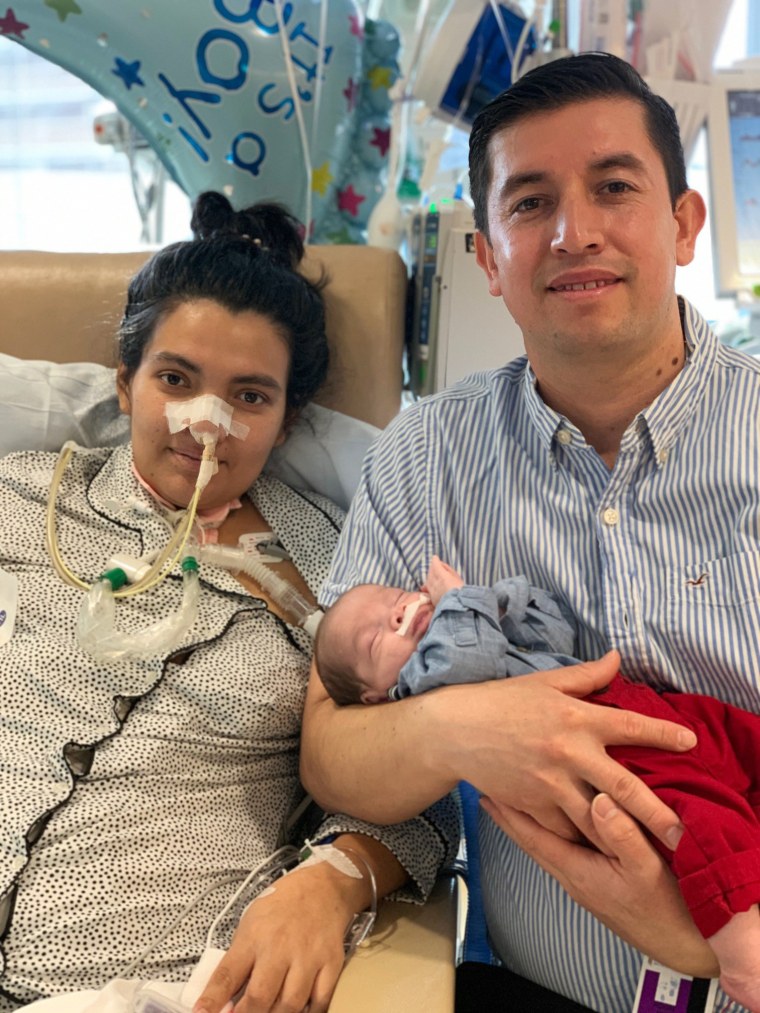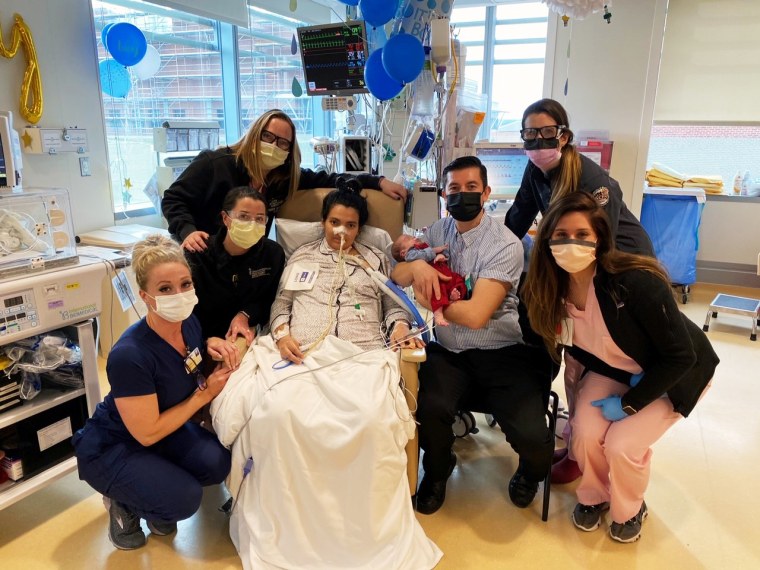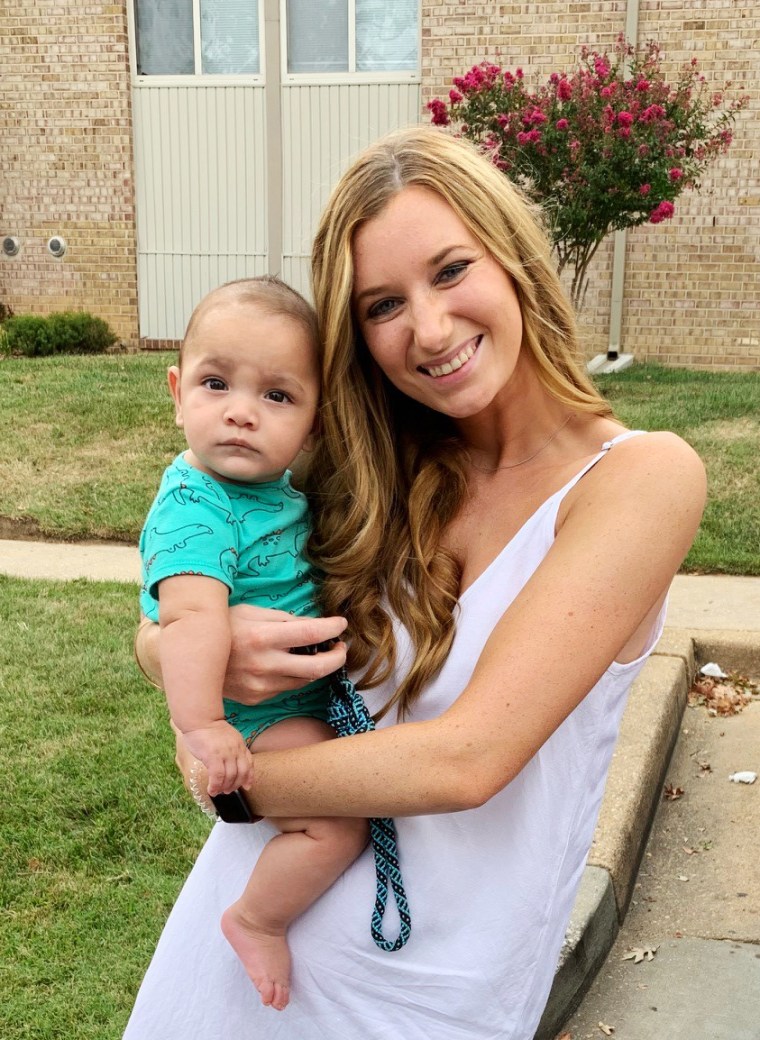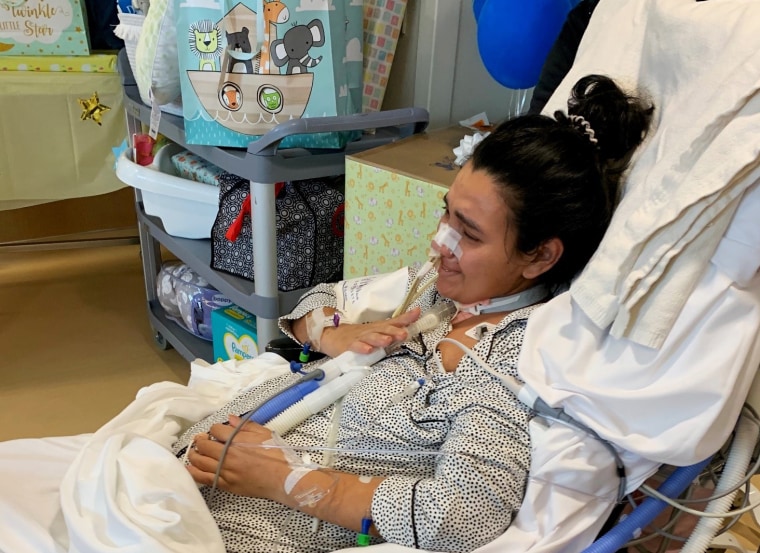María Esther Roque Díaz doesn't remember giving birth to her second son, Dylan, on Dec. 28, 2020. She had been unconscious and on life support after getting sick with Covid-19 during her pregnancy.
But scars on her throat and torso remind her of the ordeal she survived to deliver what she calls her "miracle" baby.
Almost a year later, the Salvadoran mother has one message for pregnant women, particularly other Latinas: Get the Covid-19 shot.
“If the vaccine would’ve been available to me when I was pregnant, I would’ve gotten it without thinking about it twice,” Roque Díaz said.
The 27-year-old contracted Covid-19 last year when she was six months pregnant and before Covid vaccines became available.
Roque Díaz felt severely sick and fatigued on the eve of Nov. 19, 2020, after returning to her apartment.
“I couldn’t breathe. I lived in a second floor, and I felt like I couldn’t even go up those stairs," Roque Díaz said in Spanish. "I told Wilian, my partner, to please take me to the hospital. I couldn’t take it anymore.”
“I was so scared and worried for my baby,” she said.
More than 10 months after the U.S. kicked off its Covid-19 vaccine rollout, only a third of pregnant people nationwide have gotten the vaccines, according to the Centers for Disease Control and Prevention. Vaccination rates are even lower for Latinas and Black mothers, at 25 percent and 16 percent, respectively.

Roque Díaz has since gotten the vaccine, as she's coped with an arduous recovery and has absorbed the unthinkable — how close she and her son came to not making it. She urges other expectant moms to get vaccinated and avoid putting themselves and their families at risk.
"I may be here with all this additional weight and all these scars," she told NBC News, "but at least I'm here with my family and kids, enjoying them. But unfortunately, other mothers who had cases similar to mine are not here with us."
The CDC has reported more than 141,000 confirmed cases of Covid-19 in pregnant people, including more than 24,000 hospitalized and 218 deaths.
Surviving unthinkable risks
When she became sick with Covid-19, Roque Díaz spent a few weeks at a local hospital before being transferred to the University of Maryland Medical Center. She was connected to an extracorporeal life support machine, known as ECMO, since her lungs could not provide enough oxygen to keep her and her unborn baby alive.
The mortality rate of any patient connected to an ECMO machine starts to approach 40 percent, according to Dr. Allison Lankford, an obstetrician and gynecologist who cared for Roque Díaz alongside dozens of other doctors and nurses.

Covid-19 patients like Roque Díaz often require multiple medications and "a great deal of sedation," Lankford said, to ensure they're comfortable enough on the ventilator to prevent further injuries to the lungs.
"They're not aware of their surroundings or what's happening to them," the obstetrician said.
In the months Roque Díaz spent connected to the ECMO machine, doctors collaborated with the intensive care unit team to make "decisions for continuing the pregnancy versus timing of delivery," Lankford said.
“That is certainly one of the most challenging decisions," she said. "We're constantly weighing the potential benefit of delivery for mom versus the risk to the fetus of prematurity."
Dylan was delivered at 32 weeks by C-section while Roque Díaz was still unconscious. He weighed only 5 pounds.
"I just started to cry"
Roque Díaz was told that she bled more than usual during the delivery, partly because she was on blood thinners to prevent blood clots while connected to the ECMO machine.
Two days after her C-section, her stomach started to swell and doctors found out she had internal bleeding, Roque Díaz said. Though she wasn't aware of her surgery, she describes her scar, which goes from her chest to just below her waist.
As Roque Díaz remained in and out of consciousness, nurses from the neonatal intensive care unit at the University of Maryland Children’s Hospital who were caring for Dylan would bring him to his mother’s hospital room so he could be close to her.
Roque Díaz missed out on holidays and birthdays as she recovered while unconscious until after Valentine’s Day in February.
“When I first woke up, the first thing I saw was the big scar in my belly. Then I got scared because I realized I couldn’t speak because I was intubated. So, I just started to cry,” Roque Díaz said. “My heart started racing and I was sedated again.”
When Dylan was healthy enough to be discharged, the teams of health care workers who had cared for him and Roque Díaz celebrated with a surprise baby shower.
"It was beautiful!" Roque Díaz said. "I realized what was happening after I saw balloons in my hospital room and I saw Wilian."
Debunking pregnancy and vaccine myths
All of the symptomatic and critically ill pregnant mothers who have been admitted to the intensive care unit at the University of Maryland Medical Center are unvaccinated, according to Lankford.
"Unfortunately, the Latino population is making up a number of patients in the ICU, from the pregnancy side of things, that are unvaccinated," the doctor said.
The majority of pregnant people remain unvaccinated. A lot of pregnant patients are nervous about taking medications, Lankford said, including getting well-known vaccines including for tetanus and diphtheria.
"Often patients have had a very long journey to getting pregnant and the last thing they want is anything that could potentially jeopardize that," she said.
"The most important thing is just awareness and education," said Lankford. The Covid-19 vaccine is not only safe, "but the alternative of getting Covid has the potential to be much more harmful to both mom and the pregnancy."
Concerns around fertility have also caused women trying to get pregnant to hold off on getting vaccinated, Lankford said.
"There's really no influence on fertility," she said. "It's actually safer to be vaccinated before pregnancy."

The Centers for Disease Control and Prevention, or CDC “strongly recommends Covid-19 vaccination either before or during pregnancy because the benefits of vaccination for both pregnant persons and their fetus or infant outweigh known or potential risks.”
"We know that, even in the United States alone, maternal mortality has been on the rise. Unfortunately, this pandemic has only contributed to that increase. So, in order to start to make a difference, we strongly encourage everyone to be vaccinated," Lankford said.
An older toddler who "didn't know who I was"
Roque Díaz is now back at her Maryland apartment, undergoing physical therapy after being bedridden for months.
She's also reconnecting with her oldest son, Emanuel, who was 2 when Roque Díaz was hospitalized.
“Now that I’m at home, he calls me, ‘Hey, you,’" Roque Díaz said. "That was tough on me because he essentially didn’t know who I was. When he would come near me to carry him, I had to explain to him that I couldn’t. I would tell him to please forgive me."
Roque Díaz is also slowly trying to go back to work, at least on a part-time basis for now. Her hope is to be able to buy a home and a car as she raises her family.
"I look forward to seeing my children grow up, have health and be with my family," she said.
Follow NBC Latino on Facebook, Twitter and Instagram.

